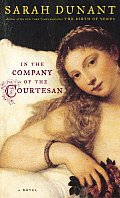About the Author
Sarah Dunant has written eight novels, including the New York Times bestseller The Birth of Venus, and edited two books of essays. She has worked widely in print, television, and radio, and is now a full-time writer. Dunant has two children and lives in London and Florence.

In the Company of the Courtesan: A Novel. Price:$16.76
by Sarah Dunant
Venice Vice
A Review by Philippa Stockley
In London, the old coconut of whether Queen Elizabeth I remained virginal is back on the dinner-party circuit, thanks to a recent television series helpfully called "The Virgin Queen." Elizabeth's sexual behavior takes our fancy more than her polylingual scholarship and statesmanship. Then, too, there's Memoirs of a Geisha topping all the lists again. Lifting up long skirts to see what is (or isn't) going on beneath has become an obsession even in the most cultured circles.
I am not indifferent to a novel where sex is the theme but sexual acts are scarcely described. It's still titillating, and readers know the score. Such tales bypass that wincing, coital prose that guarantees to propel you into a carnal fantasy with the author photo but is often so garishly embarrassing that one sees disco lights instead of letters on the page. So Sarah Dunant's In the Company of the Courtesan takes us straight to a powdered, costumed world, heady with the reek of ruffs and fur, heightened by vocabulary frank with prick and itch, but where the focus is on sexual collusion rather than descriptions of collisions.
We are in the company of a very successful courtesan, Fiammetta Bianchini, a lustrous 25-year-old with waist-length blonde hair and emerald-green eyes. The narrator is Fiammetta's clever pimp, Bucino, a hideous dwarf afflicted with painful legs.
It is Rome, 1527. The great city is being sacked by murdering, raping Spaniards and Germans. By entertaining the marauders, Fiammetta and Bucino narrowly escape the bloodbath and flee to Venice, with just some jewels and a valuable book. But Fiammetta's magnificent hair has been hacked off by jealous soldiers' women, her head horribly scarred in the process. There is no chance of working again in a trade dependent on youth and beauty, until her charms can be restored -- by any means whatever.
In Venice, the story unfolds. The cast of characters is tied into its chronological place with a few real people: notably the artist Tiziano Vecellio (Titian), the scurrilous poet Pietro Aretino and a female quack, known as La Draga, whose fainter historical footprint provides Dunant with the jumping-off point for her third principal player. Blind and crippled, La Draga fixes up Fiammetta with blonde hair extensions and nurses her to health -- after which it is straight back to bed and business, in double-quick time.
Naturally, there are twists and turns along the route to the top, but Bucino and Fiammetta overcome various travails to end up with a successful whorehouse in a fine palazzo and a rigorous appointment book of rich and powerful men, including the Doge. Yet, for a courtesan, the gilded pinnacle of success can only be a pivot to the beginning of inevitable decline.
Meanwhile, Dunant explores and enjoys Venice. And it is Venice that captivates her most and on which she concentrates her powerful descriptive talent. While the story meanders like the canals, throwing up the odd dead end, Dunant uses research and observation to conjure up a sharp city: its dank stinking waterways, its cruel nobility and harsh laws, its fabric of stone mansions and sumpy ghettos, its glittering, gleaming, sparkling, sly and silky water.
"In the waxy, pale light," she writes, "the buildings on either side grew grander, like ghost palaces, three or four stories tall, their entrances low, a few stone steps all that separated them from the slapping sea. In some, the great doors stood open onto cavernous halls with rows of the slim-hipped boats tied up outside, their silvery prows glinting under an occasional lamp."
Dunant explores her characters equally well. At the height of Fiammetta's regained fame and prosperity, she makes what Bucino considers the desperate mistake of falling in love. Worse, it is with the 17-year-old son of a noble family; he does not pay for sex, thus undermining business protocol and driving a hard wedge between Bucino, who has always kept a level head, and Fiammetta, who, after a diet of paunchy, wallet-bearing punters, is amenable to firm, fresh flesh. Out of a confrontation over this matter, the true depth of this odd couple's relationship develops.
The novel's plot is not particularly tight, but there are some great set-pieces, notably a muscular and violent battle between the Arsenale workers and the Nicoletti fishermen. Otherwise, this amiable, intelligent story ambles along pretty much of its own accord, toward a good surprise at the end.
Philippa Stockley is the author of A Factory of Cunning and The Edge of Pleasure.
Read more about this book

1 comment:
I only recommend the best.
God bless.
Post a Comment